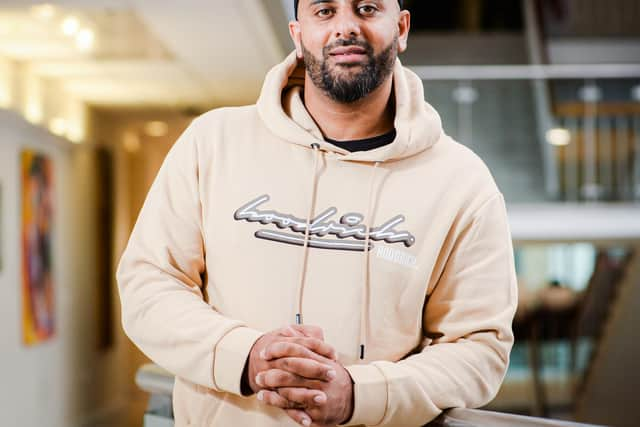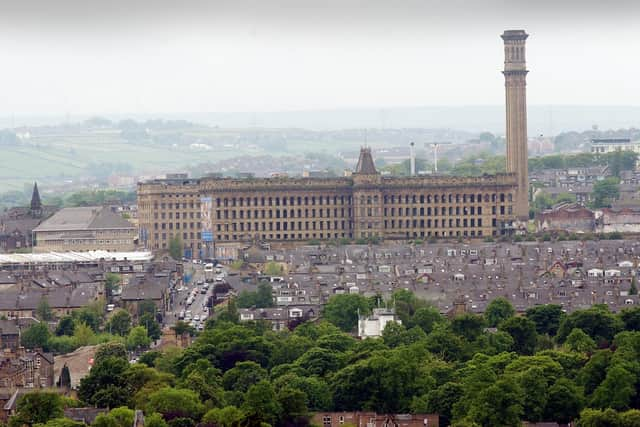Meet the Bradford academic gaining trust of gang members and drug dealers to understand what drives people to crime
He hopes his work to better understand the causes of crime will inspire change, presenting those he studies with greater opportunities. But it is not without risk.
"You see a lot of violence. I’ve been in situations which are, at times, tricky and uncomfortable and it takes a certain person to conduct such sensitive research,” says 39-year-old Dr Qasim. “My work is about gaining trust and that’s not something you can do quickly. Understanding how gangs operate and the reasons they do what they do is crucial to bring about meaningful change.”
Advertisement
Hide AdAdvertisement
Hide AdThe academic, who is a visiting research fellow at the University of Bradford, was recently recognised in the New Year’s Honours, awarded an MBE for his academic research and services to young people. “I do the work because I think it is important,” he says.


“There are so many issues I want to raise awareness of, particularly the exploitation of young people, especially those from ethnic minority communities, and the disparity in the criminal justice system, whereby lengthy prison sentences are given to people from certain communities and not to others, and this will only give those issues more visibility.”
Born in Bradford, Dr Qasim grew up in Manningham in the shadow of Lister Mills. Like many in the Pakistani community in which he was raised, his grandfather and later, his father both found work at what was once the largest textile mill in the North of England. When it closed, many were out of a job.
Dr Qasim’s adolescence was against the backdrop of poverty and racial tension, his teenage years seeing both the Manningham racial riots of 1995 and the Bradford rioting in 2001. He saw first hand the cultural divisions that led to social unrest.
Advertisement
Hide AdAdvertisement
Hide Ad“Growing up we experienced considerable racism,” says Dr Qasim, who has taught at Swansea University, Leeds Beckett and the London School of Economics. “The community became quite a reluctant community to mix, it was worried and scared.”


Segregation was a huge issue, the dad-of-three says and it was only when Dr Qasim became the first in his family to go to university, leaving home to study criminology in Swansea, that he gained greater confidence in mixing with people from different backgrounds.
After graduating, he worked with a number of schools and charities, supporting those most underprivileged in society. His role as an education officer saw him work with young drug addicts to try to help them into education, employment or training.
“What I saw was the impact that drugs, in particular heroin and crack and cocaine, had on users,” says Dr Qasim, who splits his time between Bradford and South Wales. “Spending time with them, I could see the damage that drugs could do to them. I hated this drug that was wrecking the lives of young people who had all their lives ahead of them.”
Advertisement
Hide AdAdvertisement
Hide AdThe experience ignited within him a desire to study drug dealers, to understand what motivated them to offend. He did that in Bradford where he observed street dealers from a Pakistani Muslim background. “There was genuine poverty in these places, a lack of jobs, a lack of opportunities,” he says. “There was peer pressure and exploitation taking place.
"I wanted to raise awareness of what can be done to reduce the number of young Muslim men in prison and how communities and mosques can work to help improve the chances of these young people not going down the line of crime. Ultimately I came to the conclusion that these young people need opportunities.”
He adds: “If young people, many of whom are very talented, are not given opportunities, they may turn their skills to other illegal avenues.”
Dr Qasim readily admits that had he not gained a place at Swansea University, he may well have ended up in the same position as some of the young people he now studies.
Advertisement
Hide AdAdvertisement
Hide Ad“I could have easily gone in the same direction, but I was lucky enough to be given the opportunity to take a different path. If you’re a young man, living in a community where there is poverty and discrimination, and you haven’t got support and guidance from family or school, it can be a tough place to be. Too many young people are falling victim to those who want to exploit them.”
Dr Qasim says he has reached out to people in “positions of authority” about his research but has had little response. "It frustrates me that so many of them, such as MPs and community ambassadors, don’t seem to want to talk openly about why young people from ethnic minority groups are turning to crime and what can be done about that.”
For his latest research, Dr Qasim is spending time with heroin addicts to try to gain an understanding of why they turn to the drug. He hopes his MBE will inspire those growing up in places like Bradford. “I came from a place where there was a lot of poverty, discrimination and underlying issues. If someone like me can receive an honour like this, then anyone can,” he says.
“There is hope, but you have to have the right guidance and support in place. There is a lot that needs to change in order to see more young people achieve, particularly those from ethnic minority communities - better leadership and positive role models from within the community and a police force which understands the underlying factors which contribute to criminality.”
